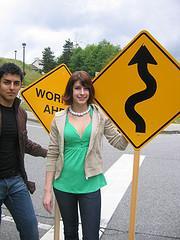
There I was, waiting for the next ridiculously overcrowded sardine can of a train on my way home after work last night, pleasantly minding my own business, leaning inconspicuously against the wall, when it caught my eye: a headline running across the big flat screen tv that Skytrain stations have these days: ‘Majority of People Regret Their Major in University,’ or something to that effect.
From what I could gather from the single paragraph, 10 second description of the story, a survey had been done of people in mid-career, and the results showed a large percentage of them would have chosen a different major if they had the chance, or the knowledge they have now. It didn’t really strike me as newsworthy at the time. I must have had other things on my mind: How many people would I have to subtly outmaneuver to successfully cram into that last spot on the train, right against the door? How would the Oilers do against Minnesota? (Answer: sadly, not well). Did I really want to go for a run when I got home? (Answer: not by a long shot, but I found a way). Would it be somehow possible to make dinner without having to go to the store for groceries? (Answer: proudly, yes).
Life’s plenty complicated without having to contemplate the significance of “news” items whilst traveling from point A to point B. However, I became aware on my relatively more comfortable commute this morning that I didn’t yet have anything picked out to write about, and I recalled that Canada Line screen and its seemingly inconsequential little news story, and some sort of light bulb mechanism clicked on in my sluggish, still-processing-that-first-coffee brain.

I spend a lot of my work day encouraging students to follow their own path, in one way or another. True, sometimes it’s hard to see a path, but that doesn’t mean that one is not being travelled. Many times students only realize that they’re studying something that they’re just not interested in after their complete lack of motivation leads to poor results. In some cases, they’re able to stick it out until the endof their degree through sheer strength of will. In far too many cases, the result is instead a letter from the university asking them to withdraw.
It might sound like the latter is the worse outcome, and fair enough – try finding a person who could take that hit without a serious blow to their self esteem. But ponder this: the student who puts a ton of work into a degree with a major they’re not really interested in looks back 5 or 10 years after graduation, and is probably one of those people in the aforementioned survey that says they wish they had chosen a different major when they had the chance. Might be that they’re stuck doing work that they just don’t find interesting or rewarding, or working an entry-level job in a field that’s totally unrelated to what they trained for.
How about that student who was asked to withdraw? Could be that that was the wake-up call for that student to try and figure out what they really like doing. In 10 years they could easily have done a totally different degree and could be in a position where they’re flowing in a positive direction, doing or studying something because they believe what they’re doing has worth, meaning, or is just fun to do.
It’s a very intuitive notion, studying something you like. But, in an age of recession and relentless consumerism, it often gets lost in the mix. It might be worth some deeper thought.
I decided to change my major – heck, even my degree program – back when I was doing my undergraduate at the U of A and UBC. Would you guess that a student in a BSc program in General Science would transfer to a BA in Psychology? My guess is no. But the decision was 100% to do with my interest level in psychology, that I just didn’t know about until I took a psychology course.
And, perhaps predictably, my GPA went up, and it didn’t seem like I was doing nearly as much work to do it.
Are you thinking of changing your major? Talk to an academic advisor to see what you would have to do. If you need some help finding your direction, we’re always happy at Career Services to give you some tools to do just that.














